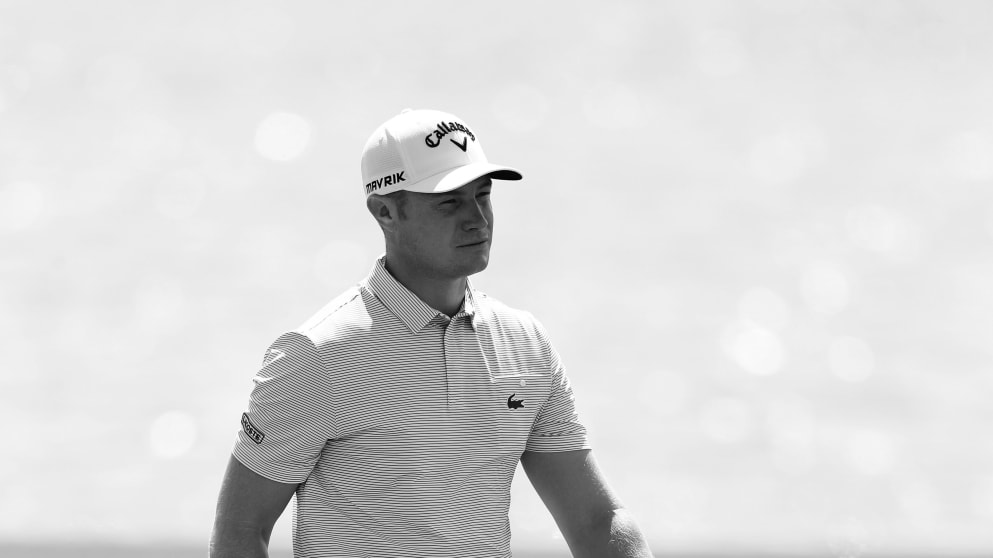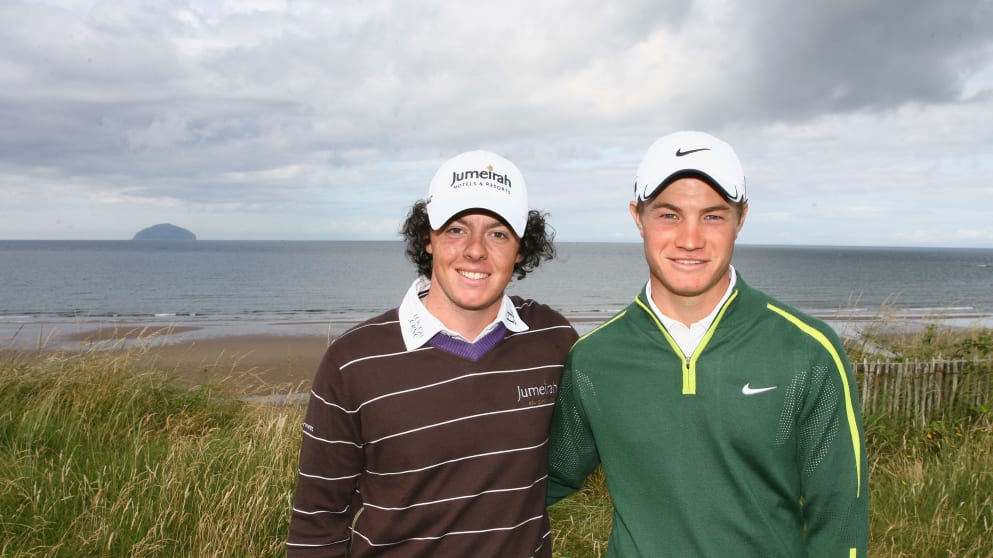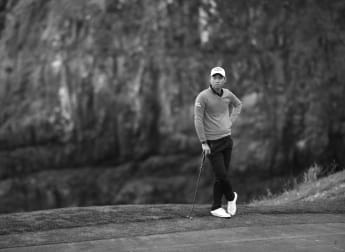
In this week’s player blog presented by Enterprise Rent-A-Car, Oliver Fisher reflects on hitting 400 events, the importance of mindset, and what still drives him.

The fact that I’ve chalked up 400 events at this age is really satisfying when I look back and reflect on it. It’s one of those things that I wouldn’t say I take a lot of pride in as I’m doing it, but to think all the work I’ve done as a kid and the work I continue to do keeps me on Tour and shows I’ve paid my dues and really committed to playing out here. This is my 15th year as a professional and I’m 32 now, 33 in September. I think as I look back on my career, with the different places I’ve been to, the number of events, it’s satisfying – even if it’s not been as smooth as I would have liked it from a results or career progression point of view.
I don’t think anyone’s expectations were higher than my own when I came out on Tour. It was great to turn professional at a young age and have a lot of interest in you, but I don’t ever feel like people were expecting things or putting pressure on me more than I was, because I knew what I could do and how I felt. My career has definitely been inconsistent at times: In 2008 I finished 50th on the Order of Merit when I was 19 then I struggled in 2009, but I’ve also played in a couple of Open Championships and a US Open, and achieved a lot of things I’m very proud of.
But I’m also a very different person than I was when I was younger, and my life and perspective has changed too. I think about the game, technique, and everything a lot. At the moment my form isn’t great so I probably think about it a lot more than if I was playing well, but I also know that golf is what I do, it doesn’t define who I am as a person. I learnt that from a neighbour of mine in 2009, and it was probably the biggest lesson I’ve been taught since I turned pro. She talked to me about staying in the present, and I read a couple of books, and it made me realise that the biggest thing I can learn from being a golfer is that while I’m lucky enough to do this for a career, and it’s something I love, who I am is different.
You can go and shoot 65 or 80, those scores reflect how you’re playing, but it’s important to be able to also care about who you are, what you stand for, how you go about your day to day business. Golf is what I do, but I also enjoy playing it with friends. I have a family, I’m a husband, a dad with another baby on the way, and I enjoy being in the garden. As I get older - and touch wood, continue to play on Tour as long as my body and mind can keep playing- I think it’s really important to keep imagining how I’m going to evolve as a person and as a player and keep golf fun. Those things are important to separate.
Another European Tour milestone for @oliverfisher_59 🔖
— The European Tour (@EuropeanTour) February 19, 2021
I also know a lot more about the game and all of facets of the Tour and how they work than I did when I was 19. I have established routines and become more interested in other parts of golf. As I’m getting older, I’m enjoying learning more about architecture and the way golf courses are made, and I find talking to different guys at the Tour about the agronomy and set-up incredibly interesting. I’ve always loved playing on courses which are enjoyable and memorable, and I think being out here this long just makes you appreciate more, and makes you more rounded as a person.
That idea of evolving has been a big thing in the past year, and it’s probably the toughest I’ve had mentally. We’re so incredibly lucky to have tournaments on, and the Tour have done such a good job, but I’ve found it hard to adapt and get into the mindset of being excited to play because I’ve become so used to the Tour as it was before the pandemic. Typically, you would see friends in different countries, or have friends and family come out, and it’s just been very different in the bubble. For me, I think it has just enforced that idea that the most important thing as a player being out here is being able to evolve and enjoy the game. You need to be able to break it up into different weeks, and it’s just a matter of keeping each area as stress free and the game as simple as possible. A lot of that has just been analysing where I feel like I’m losing shots in regard to the field or places where I don’t feel as mentally strong as I do in others, and then I can pinpoint what I want to work on. I think if I can keep it as simple as possible on the golf course, I’ve got the best chance of going out and performing.

Mindset is so important, because playing golf is not a smooth career: Sometimes it gives you everything and sometimes it gives you nothing. It’s all peaks and troughs, and it’s not as easy as it looks. The reality isn’t watching guys every week under par or contending and looking like they all hole 20 footers and 30 footers, the reality is that it’s a scrappy game. I think that’s why it’s important to stay in the present as much as you can, and always go back to the start to evaluate ‘what I want to do here, how do I want to go about this’ or thinking about what you did when you enjoyed it the most. That can be difficult as a professional, and I feel like my perspective of that is OK. I feel happy enough with where I am, it’s just a case of grinding it out when it gets tough and improving in the areas I need to so that I can start climbing up the rankings.
With the standard out here now, everyone has what it takes in terms of ability to win, but the biggest thing is keeping it together mentally for four days. There’s so much down time being in your hotel room or travelling and it gives you a lot of time to think about things, so being able to satisfy your mind with other things is important. You’ve got to be able to manage your time well, manage your mistakes well and limit errors on the course, and I think people underestimate just how good the good guys are, because they are able to do that so effectively. Someone like Rory McIlroy, who can generally be near to competing on a Sunday pretty much wherever he goes in the world, or someone like Lee Westwood who has been as consistent as he has, or Miguel Angel Jimenez. Anyone has the chance to win, but the guys that put themselves in with the chance to do it more regularly are even more impressive.

Having a handle on adrenaline is also part of that mental battle, of being able to manage the balance of using your instinct and ability and being calm enough to execute it through the golf shot. Whether it’s on the tee or coming down the last on the cut line, adrenaline is adrenaline, and you’ve got to be able to understand and react to that anxious but excited feeling. The day I shot 59 (at the Portugal Masters in 2018) was a day I really managed to execute that well. I knew the score was on after I made the turn in seven under, and after I started the back nine birdie-birdie-birdie I felt like I was odds on because 15 and 17 had been playing easy. Then the TV cameras came out, and obviously I could have made bogey at any time, but I really managed to keep my head and not get ahead of myself. I was incredibly nervous with that putt for 58, as I was with the tee shot and the wedge, but at the same time it wasn’t to win a tournament. I knew it had never been done before on the European Tour, and the worst thing that could happen was that I made a bogey and shot 60 or a double and 61 so it would have been a good day anyway. Now I look back on the way I handled that pressure with a lot of pride because I had the chance to do it, and I did.
I don’t look at myself and question if I will win again. There are times where I’ve been in contention – albeit I haven’t won for a few years – and I feel like I’ve dealt with things pretty well. It hasn’t quite fallen into place on Sunday, but afterwards I just look at what I can improve. I’d love to be able to give myself more chances to be up there, and its satisfying to have won on the European Tour, but I think more about what area of my game I need to be a bit better to get a better level of consistency.
I think success can be measured in so many ways too, and it can happen at different times. You look at someone like Rory. He and I came out at a similar time, played amateur golf at a similar time and he’s played several Ryder Cups and achieved so much in the game. But I still look back and think Oli Fisher is a successful golfer. There are still parts of the game I’ve wanted to get to that I haven’t so far, but there’s still an opportunity to get there. I’m 32, some guys have had the best parts of their career between 35 and 45, or don’t even get on to Tour until their 30, so there’s nothing to say that I won’t have a great last 10 years or however long I can go on for. It’s a big part of what continues to motivate me to get me up in the morning, to go to the gym, and practice.

I’ve still got a lot of drive in me. I’d love to be able to make a bit of a run at climbing the World Rankings, and get my game in order so that I can compete in a way I know I can, that will help me start achieving things I want to achieve. I’m also a dad now, and we’ve got another baby on the way, and I want to provide for them and do the best I can for them. But at a fundamental level, what drives me is that I still just love playing golf and the challenge of thinking today is going to be the day I master it, or improve something I’ve been working on.










